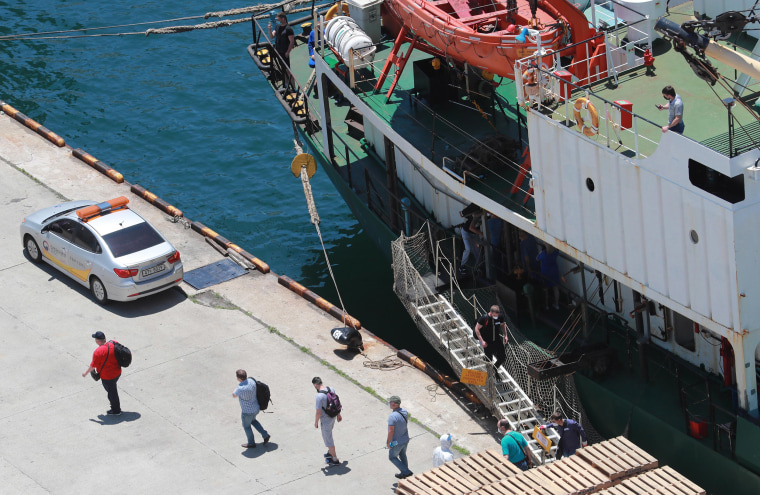MOSCOW — Fears have been raised about a fresh coronavirus outbreak in South Korea as the majority of a Russian merchant ship's crew tested positive for the illness, after coming into contact with scores of dock workers in the city of Busan last week.
The 4,000-ton Ice Stream cargo ship reported that its 21 crew members were healthy before they began unloading its cargo alongside Korean dockworkers who were not wearing masks, South Korea's Yonhap news agency reported Wednesday.
Local officials nonetheless tested the crew and Yonhap reported that a shipping agent notified local authorities that the Ice Stream’s captain was swapped out at the last minute before the ship departed Vladivostok on June 16, due to a positive coronavirus test.
The Russian consulate in Busan confirmed in a Facebook post on Tuesday that 16 of the crew tested positive for the virus, while the remaining five have shown negative results. The difference in infection counts reported by the consulate and the 17 reported by Yonhap was not immediately clear.
Kim Ganglip, the head of South Korea’s Central Disaster and Safety Countermeasures Headquarters, told Yonhap on Tuesday that stricter measures will now be applied to all Russian vessels entering the Port of Busan.
"All Russian vessels entering the port of Busan will have to go through on-board quarantine inspections from today," he said.
South Korea has been praised for the way it has managed the epidemic. At its peak in late February, the Korea Centers for Disease Control and Prevention reported 909 daily cases. The majority emerged in the city of Daegu, once the nation’s COVID-19 epicenter.
But people across the country kept to strict guidelines by staying cooped up inside their homes ad this, paired with early, accessible testing and intensive tracing helped South Korea flatten the curve by late March.
The Russian government has recently been signalling to its own citizens that the worst of the COVID-19 pandemic in Russia is over, and that government measures have successfully contained the spread of the virus.
But Russia has reported over 600,000 confirmed cases since the start of the pandemic, making it the world’s third largest outbreak, and many have seen political motives behind the Russian government’s insistence that Russia has weathered the storm and the virus is on the decline.
Download the NBC News app for full coverage of the coronavirus outbreak.
Russia is currently holding a week-long constitutional referendum that, if passed, will see President Vladimir Putin’s presidential term limits reset, allowing him to rule until 2036. Opposition figures have accused the Kremlin of downplaying the virus to encourage people to go out and vote.
South Korea is not the first country to accuse Russia of exporting positive COVID-19 cases. In recent weeks, China has reported a number of cases entering the country from across the Russian border.
